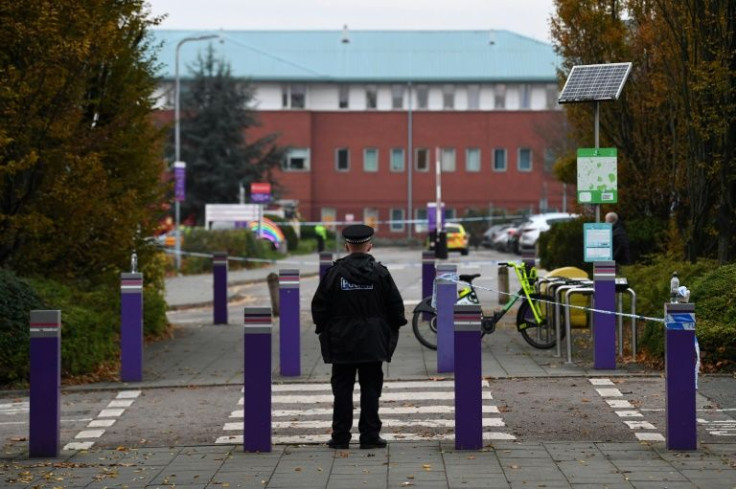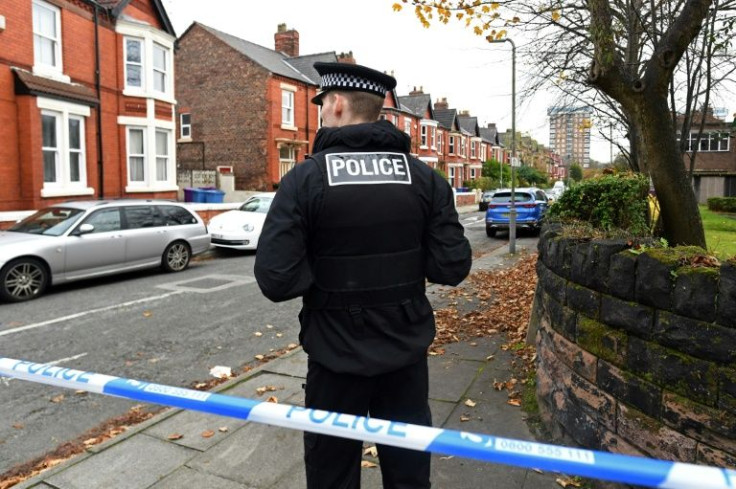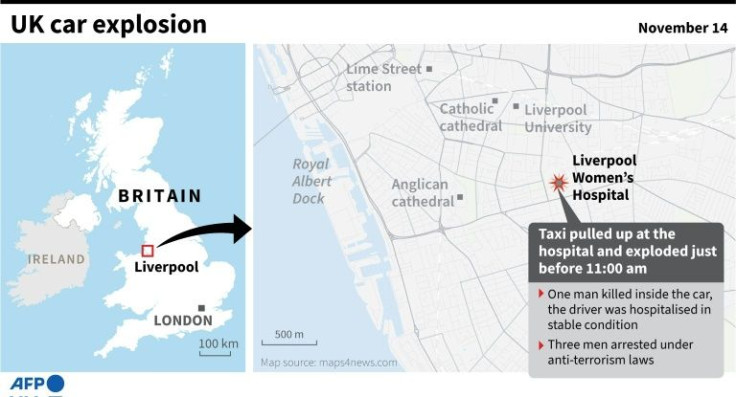Police Name Dead Suspect In Liverpool Blast As UK Raises Terror Threat Level
Britain raised its terrorism threat level Monday, hours after an improvised explosion outside a hospital in Liverpool, as police named the suspect believed to have made the homemade device before dying in the blast.
Interior minister Priti Patel said intelligence officials had increased the threat assessment to "severe" -- the second-highest level, meaning an attack is highly likely -- following the second terror incident in a month.

Last month, veteran British MP David Amess was stabbed to death as he met constituents in southeast England, in an attack that prosecutors have said had a "terrorist connection".
The blast outside the Liverpool Women's Hospital shortly before 1100 GMT on Remembrance Sunday destroyed a taxi and killed the passenger suspected of making the crude device, but only injured the driver.
Police in northwest England said within hours that the blast was being treated as a "terrorist incident" and on Monday evening named the deceased suspect.

"Our enquiries are very much ongoing but at this stage we strongly believe that the deceased is 32-year-old Emad Al Swealmeen," senior investigating officer Detective Chief Inspector Andrew Meeks said in a statement.
He gave few other details, but noted Al Swealmeen was connected to two addresses police raided following the incident, living at one while recently renting another where officers have recovered "significant items".
"We continue to appeal for any information about this incident and, now that we have released his name, any information that the public may have about Al Swealmeen, no matter how small, may be of great assistance to us," Meeks said.

Prime Minister Boris Johnson said the latest attack was a "stark reminder of the need for us all to remain utterly vigilant".
"But what yesterday showed us all is that the British people will never be cowed by terrorism. We will never give in to those who seek to divide us with senseless acts," Johnson said.
Earlier Monday, Russ Jackson, in charge of counter-terrorism policing in northwest England, said the motive for the attack was unclear.
He confirmed the device which ignited and turned the taxi into a fireball was built by Al Swealmeen after he was picked up in the Kensington neighbourhood of the city.

The explosion came just minutes before the Remembrance Sunday service at nearby Liverpool Cathedral, prompting speculation the event was the intended target.
"We cannot at this time draw any connection with this, but it is a line of inquiry which we are pursuing," said Jackson.
Three men aged 21, 26 and 29 were arrested under anti-terrorism laws in the nearby Kensington area soon after the explosion and remain in custody for questioning.

A fourth man, aged 20, was detained earlier Monday, Jackson said, adding that "significant items" had been found at a second address in Sefton Park, near Kensington.
On Monday afternoon, investigating officers carried out a controlled explosion "as a precaution" in Sefton Park.
The blast and fireball sent thick smoke into the air as Britain was about to fall silent in tribute to its war dead and military veterans.
There was prompt praise for the taxi driver, named locally as David Perry, following reports he locked the male passenger inside the cab after growing suspicious about his intentions.
He was treated in hospital but released Monday, according to his wife, who posted on Facebook that it was "an utter miracle" he survived.
"There are a lot of rumours flying round about him being a hero and locking the passenger inside the car... but the truth of the matter is, he is without a doubt lucky to be alive," she wrote.
Johnson, who convened a government emergencies and contingencies meeting in response, said it appeared the driver "did behave with incredible presence of mind and bravery".
Some 2,000 people attended the religious service of remembrance, one of the biggest outside London, and a military parade, according to the Liverpool Echo newspaper.
The scene at the hospital remained cordoned off on Monday, as did the streets around the two properties under investigation, where forensics officers in white suits were seen.
Britain had downgraded its terrorism threat level from "severe" to "substantial" in February.
It had been raised last November after a deadly shooting rampage in Vienna and several attacks in France. All were blamed on Islamist extremists.
Prosecutors have said the murder "has a terrorist connection" with "religious and ideological motivations".
© Copyright AFP 2024. All rights reserved.




















